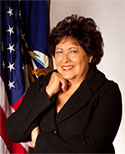What You Need To Know About The Latino Vote In 2012
 The appointment of Katherine Archuleta as political director of president Obama’s re-election campaign is significant, but not for the obvious reasons. Yeah, it’s a big deal that Obama gave a Latina the nod for an important post in his campaign machine. And yeah, it’s a first, in the sense that Latinos have not had a place of visible leadership in the Obama administration. But in context, though, the important thing about the Archuleta appointment is that it’s a smart political move.
The appointment of Katherine Archuleta as political director of president Obama’s re-election campaign is significant, but not for the obvious reasons. Yeah, it’s a big deal that Obama gave a Latina the nod for an important post in his campaign machine. And yeah, it’s a first, in the sense that Latinos have not had a place of visible leadership in the Obama administration. But in context, though, the important thing about the Archuleta appointment is that it’s a smart political move.
The Latino vote is crucial of the 2012 election.
At least that’s the prevailing thought. The logic is that the enormous growth of the Latino population translates into enormous political power. And a state-by-state count of votes and potential seems to back that idea. Here’s how it breaks down according to a recent article in the US News and World Report:
- the population identifying itself as Hispanic or Latino grew by 43.0 percent from 2000 to 2010
- there are 118 existing congressional districts in which more than one-fifth of the population is Hispanic
- 93 of those districts are in California, Texas, Florida, and New York, the four states with the most 2012 electoral votes
- 52 percent of Hispanics said they would “definitely” or “probably” vote to re-elect Obama, compared to 42 percent of the total population
- only 33 percent of Latino registered voters counted immigration as one of their three top election issues
- Hispanic voters face more economic hardship than the nation as a whole, with unemployment among Hispanics at 11.9 percent
But all is not as it seems.
Add to all this the fact that a large Latino population does not necessarily equal a large voting block. First because Latinos are not monolithic voters, although they tend to vote Democratic. And second, not all Latinos can or do vote. We know that of all of the Latinos in the U.S only about 41% are eligible to vote – they are citizens more than 18 years old. Of those only a small percentage is registered to vote, and of those a smaller number goes to the polls.
And yet, with all of these considerations, voting Latinos live in strategic parts of the country with significant electoral importance where their influence can sway an election.
Is she the appointed Latino vote wrangler?
Does this mean that a simple appointment of a Latina to a leadership role in a campaign is enough to make a difference? Yes, and no. It does because it resonates among plugged-in, educated, professional Latinos. But resonance doesn’t mean sway, it only means that the appointment is noticed.
According to the US News and World report Archuleta’s role in the campaign was “broadly defined by campaign officials, but
she’ll likely work on Latino outreach as well as being in charge of “outreach to elected officials and groups,” the Obama campaign said.
I’m not sure what that means, but it sounds like she’ll be the lead Obama surrogate in the Latino community. And for that she’s well qualified. She’s a native of Colorado, a Latino swing state, and is
currently the chief of staff for Labor Secretary Hilda Solis. She played a key role in orchestrating Denver’s 2008 Democratic National Convention on behalf of the city.
The appointment is significant and it’s inherently political. It’s a transparent campaign move but it’s also inclusive. And for many Latino political operatives, observers and voters, it’s also about time.
Follow Victor Landa on Twitter: @vlanda
[Photo Courtesy DOL]

